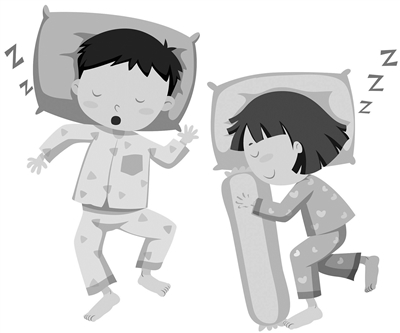Little baby’s frequent bed wetting is actually snoring.

The five-year-old baby who has not wet the bed for a long time suddenly "draws a map" frequently at night. Is it because of drinking too much water or kidney problems? The answer is beyond Bao Ma’s expectation — — All this is actually snoring.
Case playback
Came to the otorhinolaryngology department because of bedwetting
Cong Cong is a lively and lovely five-year-old boy, but in recent months, Cong Cong, who has long stopped wetting the bed, suddenly began to wet the bed again. At first, my mother didn’t care, just told Cong Cong to go to the toilet before going to sleep, but bed wetting still appeared from time to time, and Cong Cong often couldn’t wake up in the morning. My mother began to worry, and she took Cong Cong to the hospital in a hurry.
After arriving at the hospital, they went to urology and nephrology, and found no problems. Finally, under the recommendation of these two doctors, they came to otorhinolaryngology head and neck surgery.
When I came here, the first question the doctor asked turned out to be: "Does the child snore when sleeping?" Congcong’s mother replied, "Yes, there is snoring, but is it related to bed wetting?" The doctor explained in no hurry that snoring does have something to do with bed wetting. These two symptoms seem unrelated, but in fact, many children’s bed wetting at night is caused by snoring.
How does snoring trigger bed wetting?
Under normal circumstances, we don’t snore when we sleep. However, if the upper airway of the nasal cavity or throat is locally narrowed for various reasons, when breathing, the airflow passes through the narrow place, and the muscles are vibrated to make a snoring sound.
Medically, this disease is called "obstructive sleep apnea hypopnea syndrome". The main manifestations of this kind of diseases are sleep snoring, mouth breathing and breath holding. What is more frightening than snoring is that children can’t breathe enough air when they sleep because of local stenosis such as nasal cavity or throat, which leads to insufficient oxygen supply. Over time, chronic hypoxia will affect children’s development in all aspects.
So, how does snoring cause bed wetting? Bedwetting is medically called nocturnal enuresis, which means that children over 5 years old involuntarily urinate at night. At present, its etiology is not clear, but many research reports show that it is related to obstructive sleep apnea hypopnea syndrome. Mainly, this disease can cause children to suffer from chronic hypoxia, resulting in oxidative stress reaction, leading to bladder instability and enuresis. At the same time, obstructive sleep apnea hypopnea syndrome can cause sympathetic nerve excitation, lead to a large number of catecholamine compounds accumulation, and eventually lead to nocturnal enuresis.
Due to the long-term lack of oxygen supply, children’s behavior and growth and development will be affected to some extent. In addition, due to long-term oral breathing, the impact of airflow on the hard palate will deform and arch the hard palate, and the development of the oral cavity and maxillofacial region will also change over time. Gradually, children will have short and thick upper lip, high arch of hard palate, irregular teeth arrangement, prominent upper incisors, difficult facial muscles to move, lack of expression, etc. This is the "adenoid face" that is widely concerned by parents at present.
Remember to see a doctor when your child has these symptoms.
Remind parents and friends that children snore, don’t underestimate them, and don’t think that children are just "tired of playing" or sleeping soundly.
Some children show short-term apnea, and parents can find that although the child is still breathing in the chest and abdomen while sleeping, there is no airflow through the mouth and nose. There are also some children who have no apnea, but their breathing during long-term sleep is in a state of insufficient ventilation. In the long run, children’s lack of ventilation at night and disordered sleep structure will cause a series of pathophysiological changes.
Children who snore often find it difficult to get up in the morning, often feel sleepy during the day, lack of concentration and hyperactivity, poor memory, learning difficulties, or nocturnal enuresis, growth retardation, hypertension, obesity, etc., and even some children may have psychological and behavioral abnormalities, such as abnormal shyness, rebellion or aggressive behavior. If the child often snores in sleep, or is accompanied by breathing with his mouth open, holding his breath at night, wetting the bed, etc., parents should take the child to the otorhinolaryngology head and neck surgery.
At present, the clinical diagnosis and treatment of obstructive sleep apnea hypopnea syndrome is very mature, and many children have achieved satisfactory results after drug treatment or surgical treatment. Timely diagnosis and treatment can not only restore children’s healthy and happy childhood as soon as possible, but also avoid various complications.
Text/Zhang Bing Lu Yingxia
(Children’s Hospital Affiliated to Capital Institute of Pediatrics)